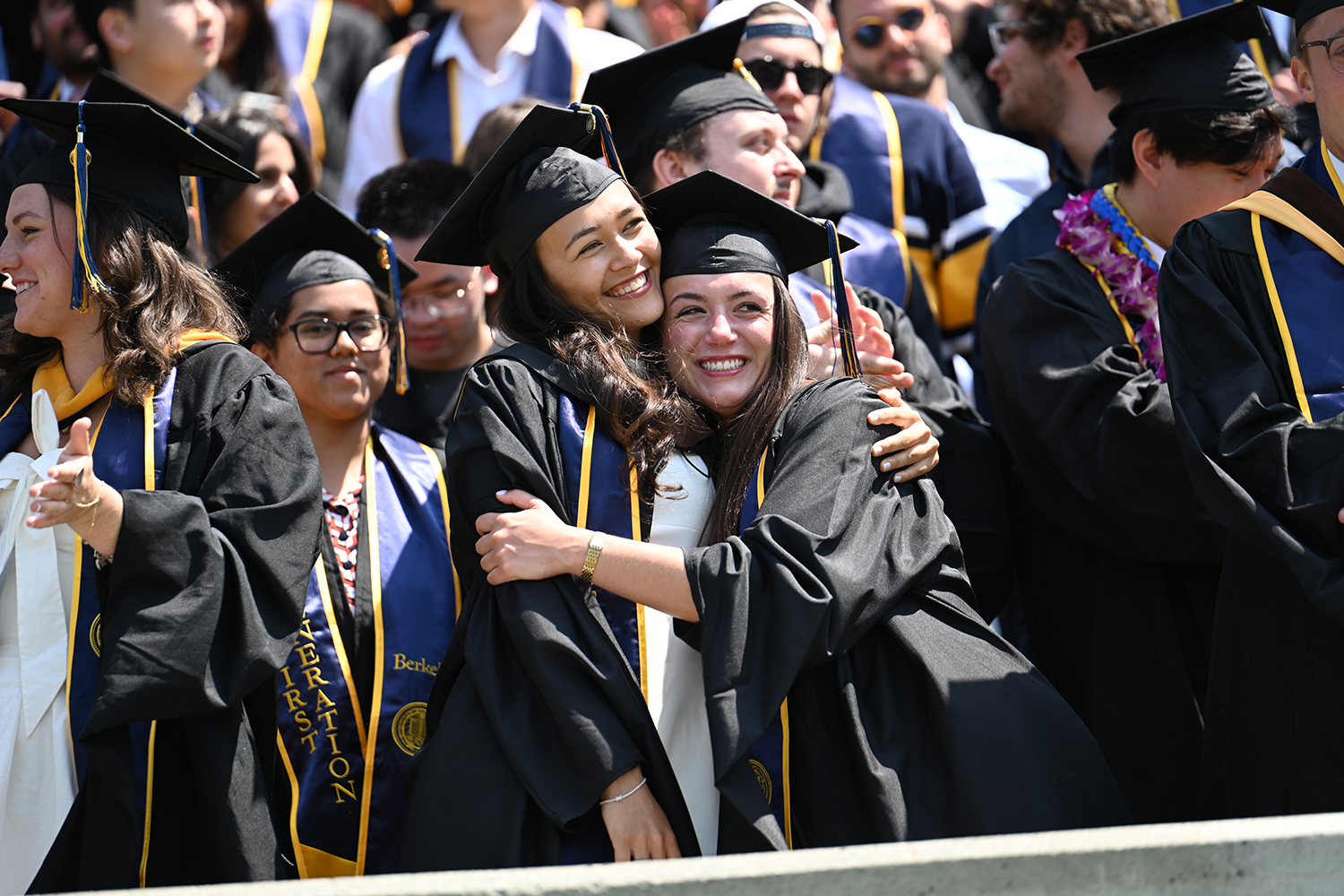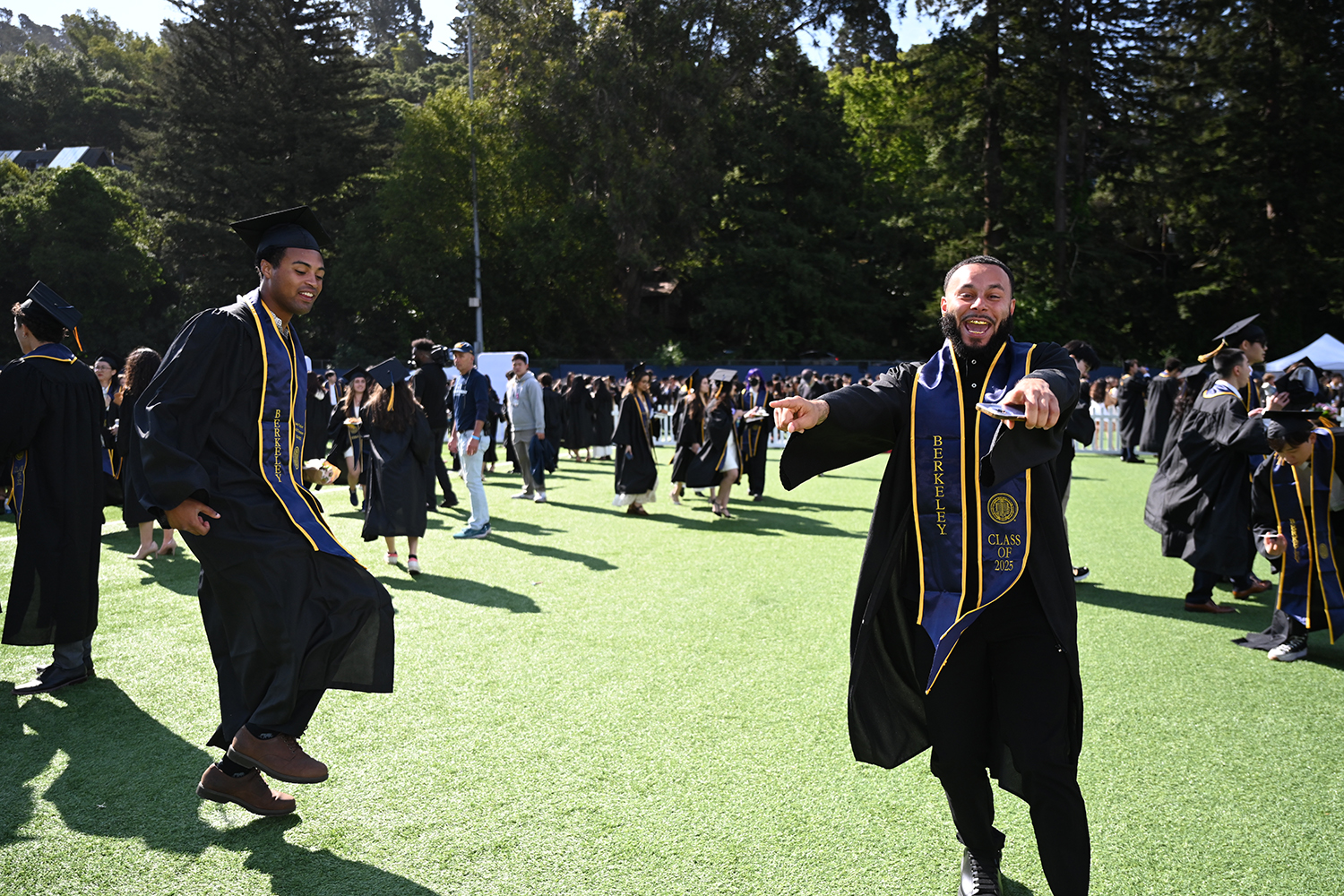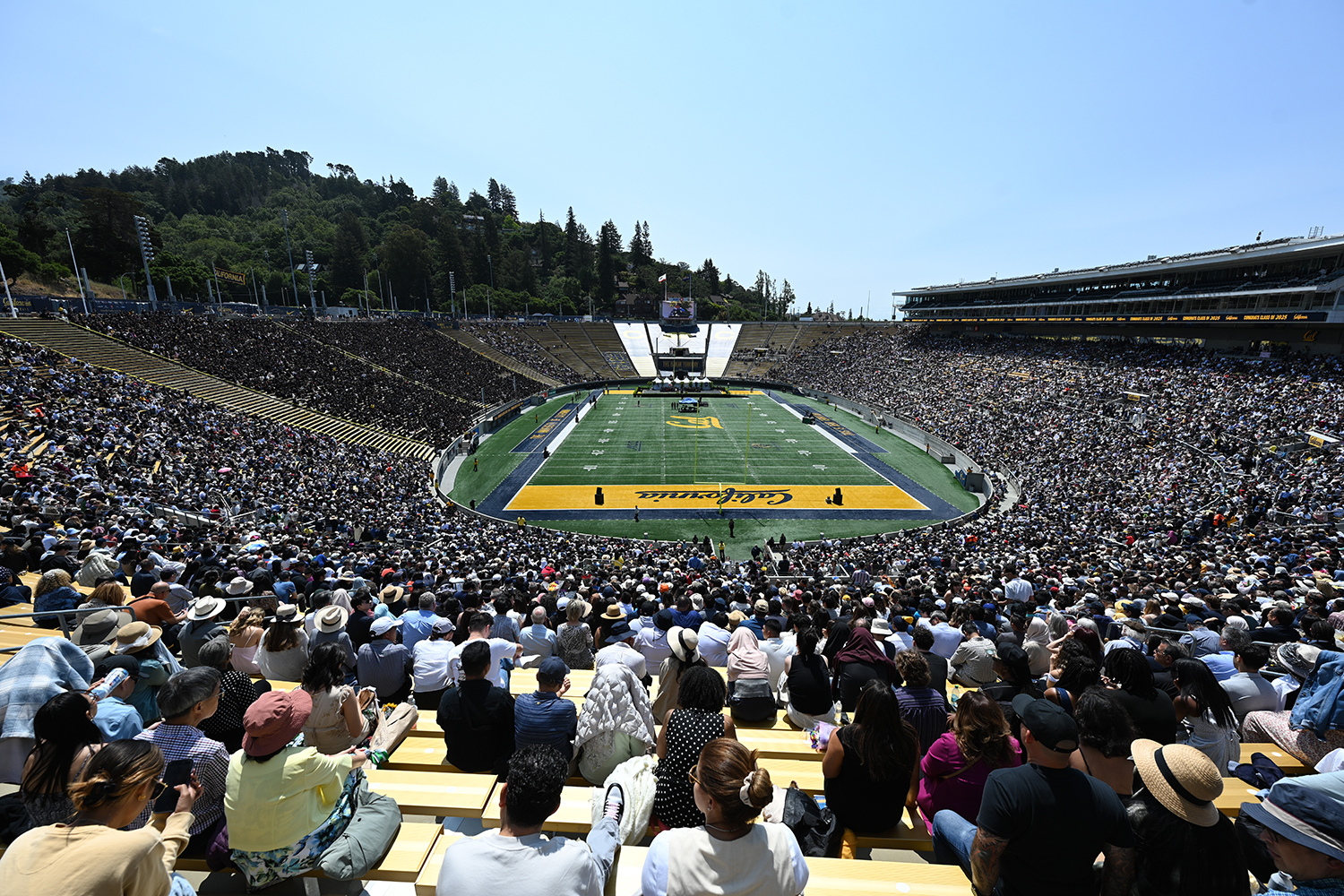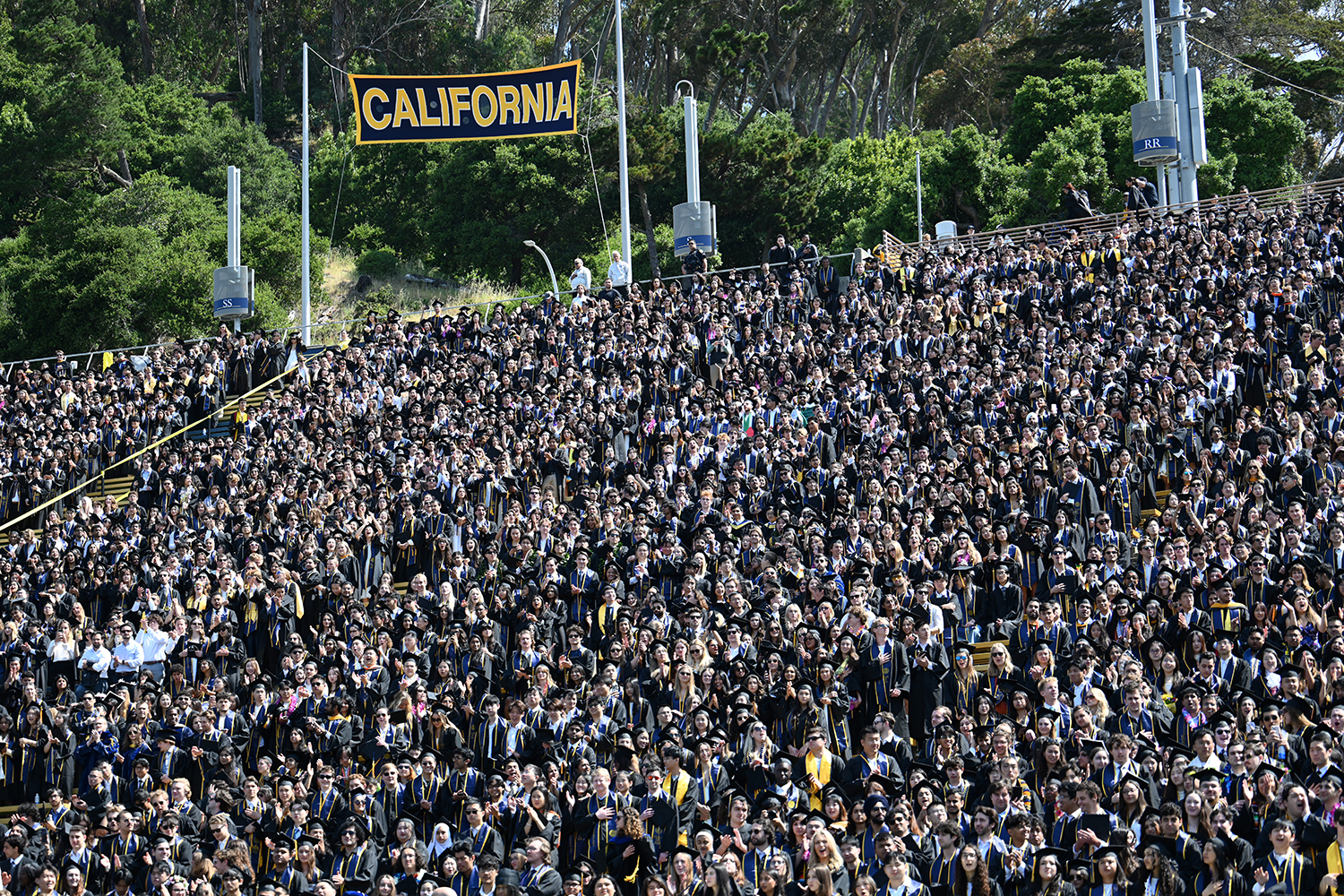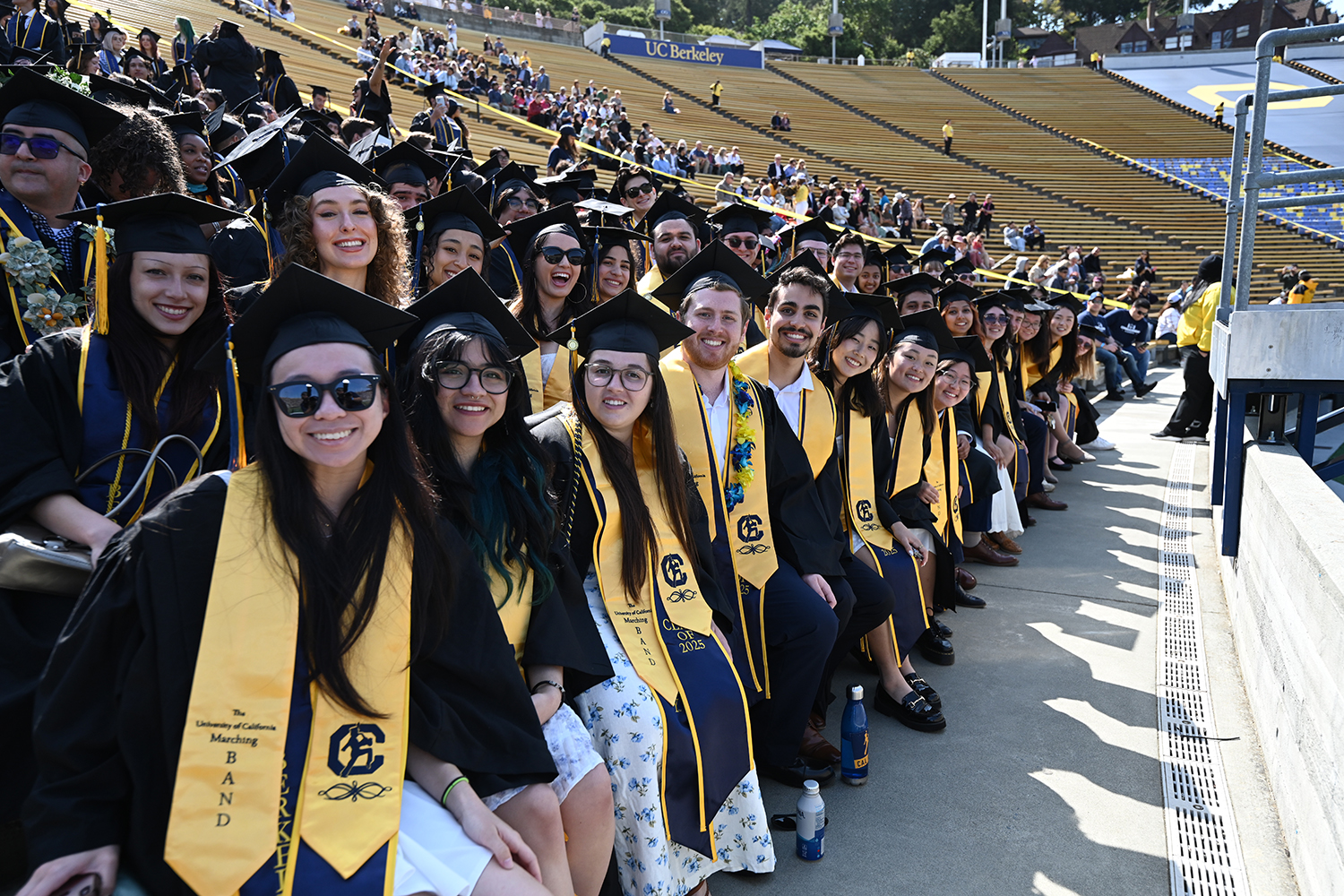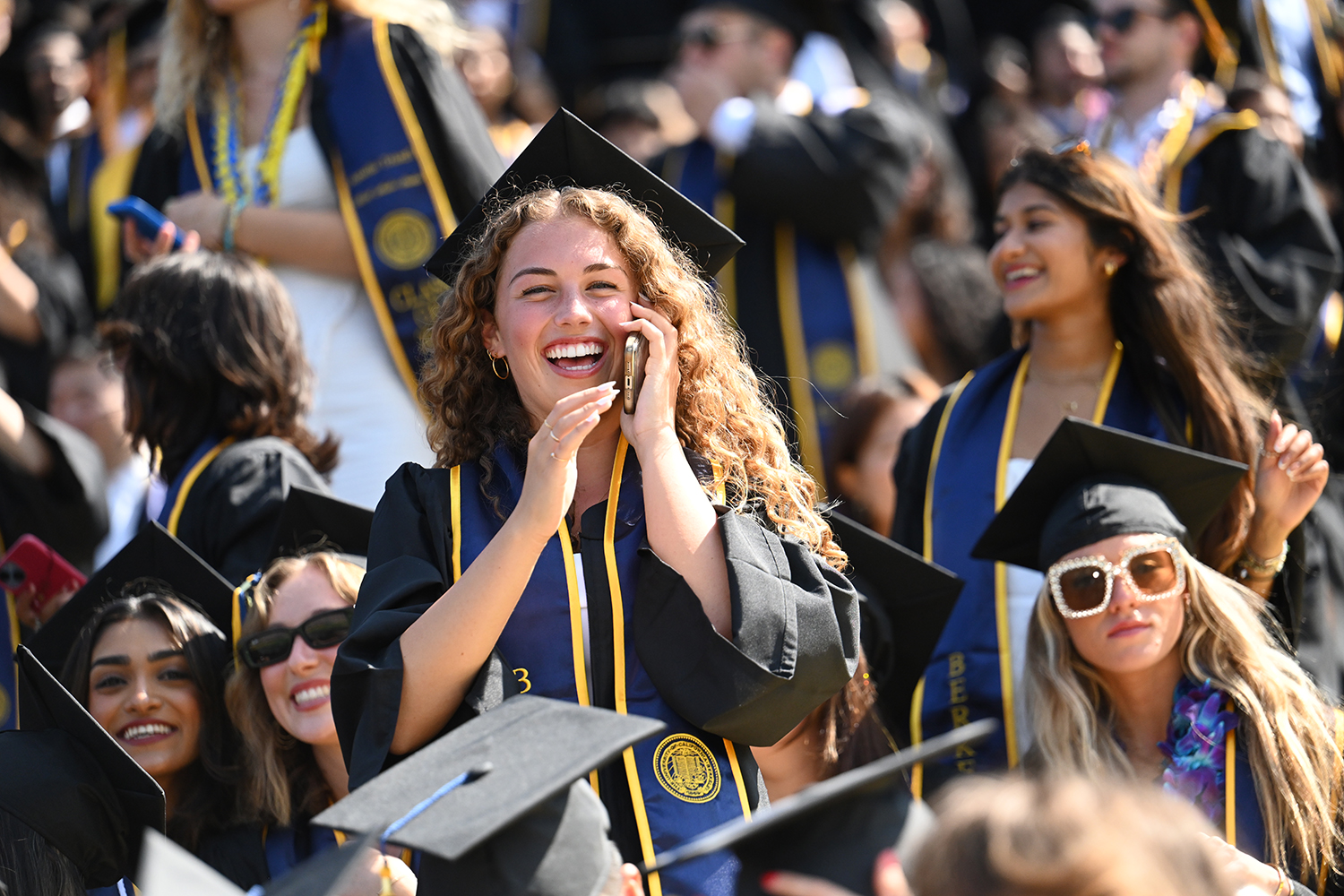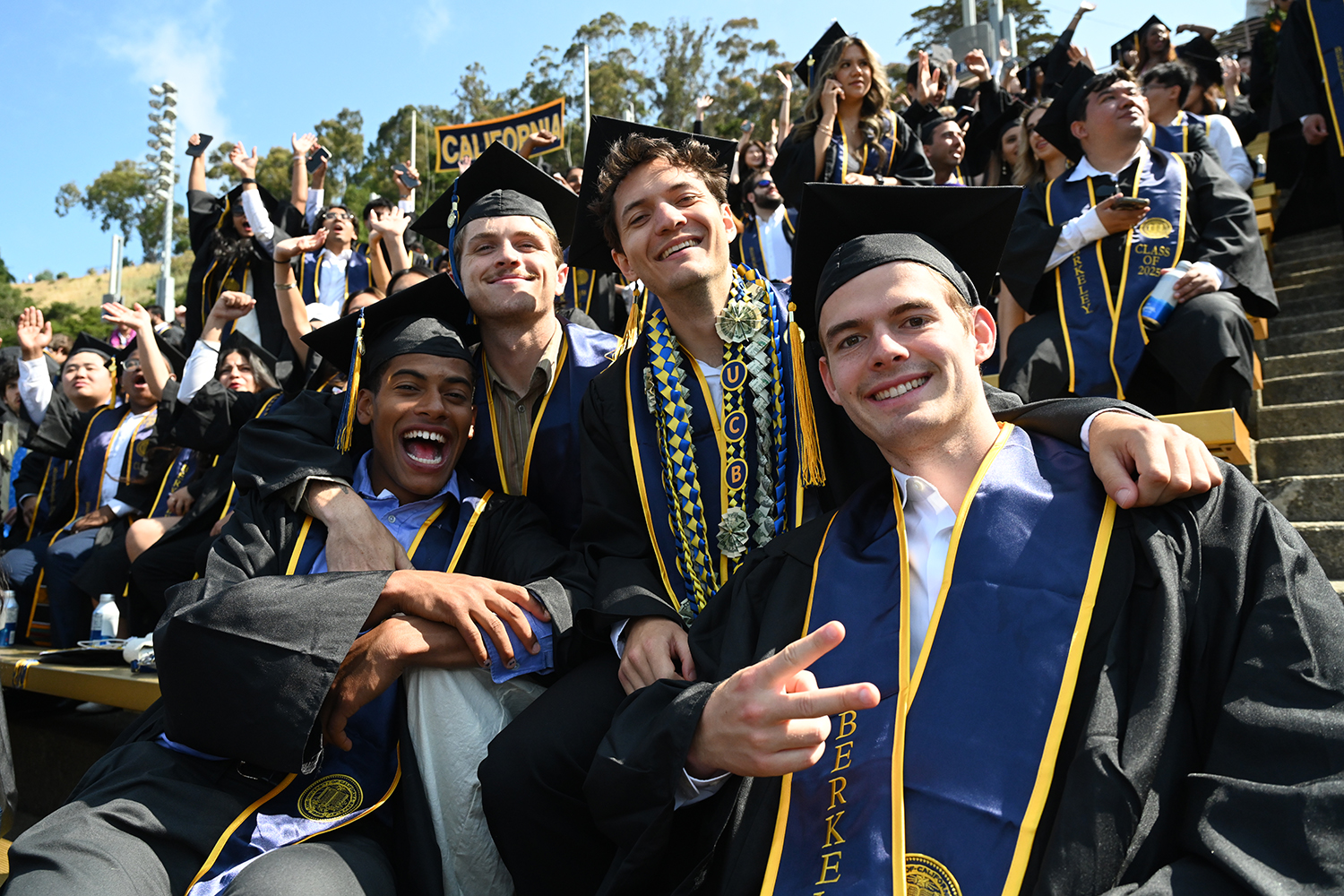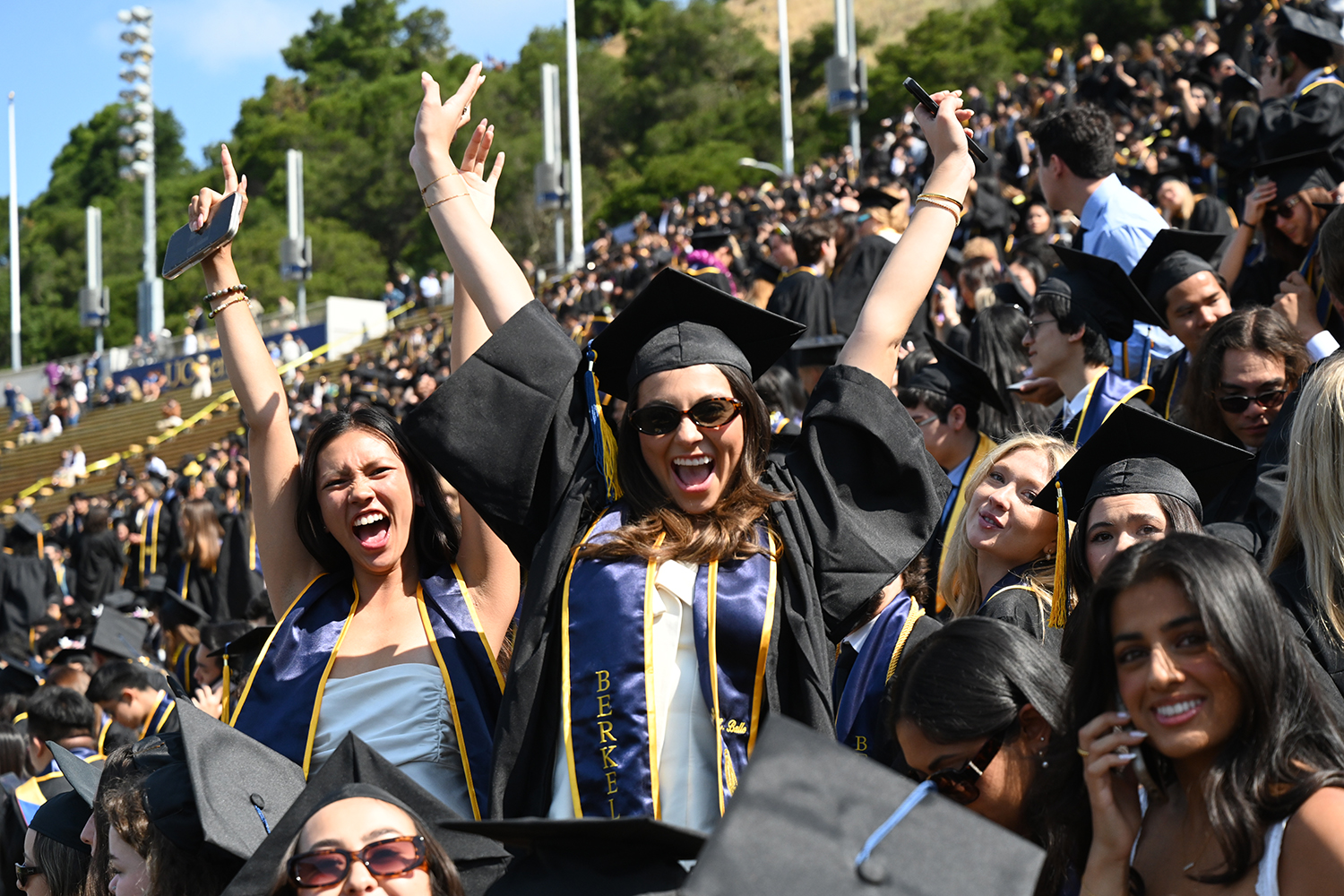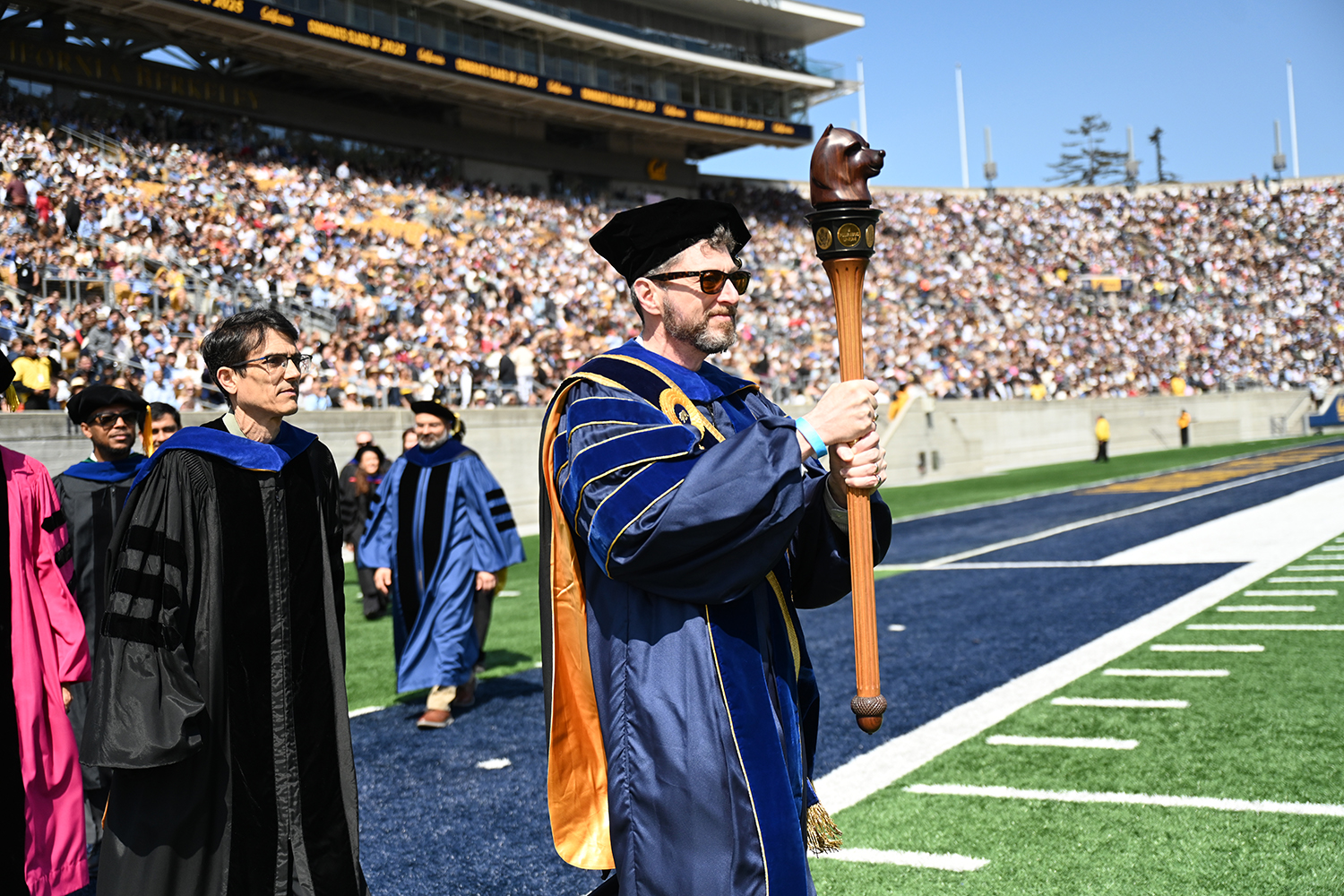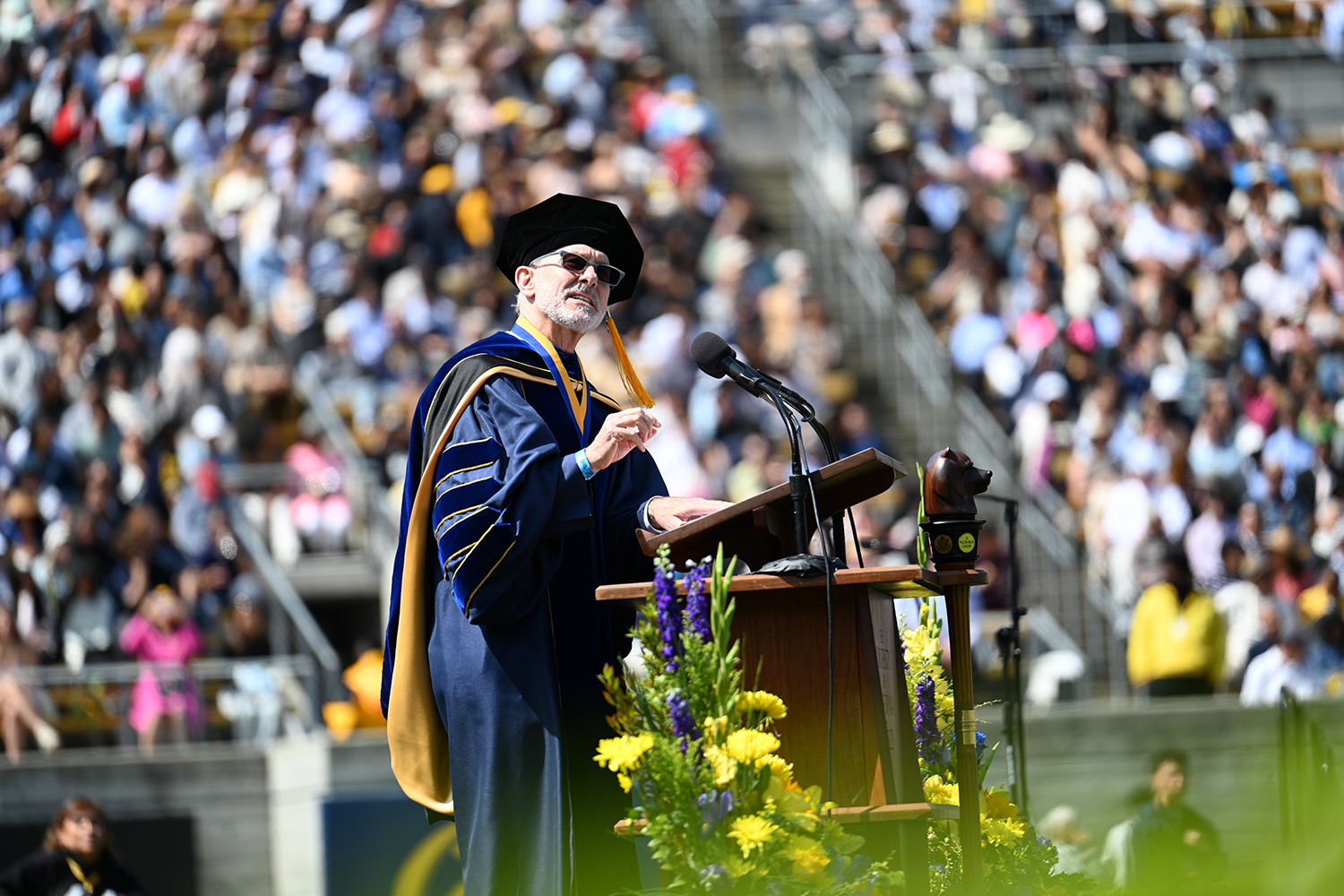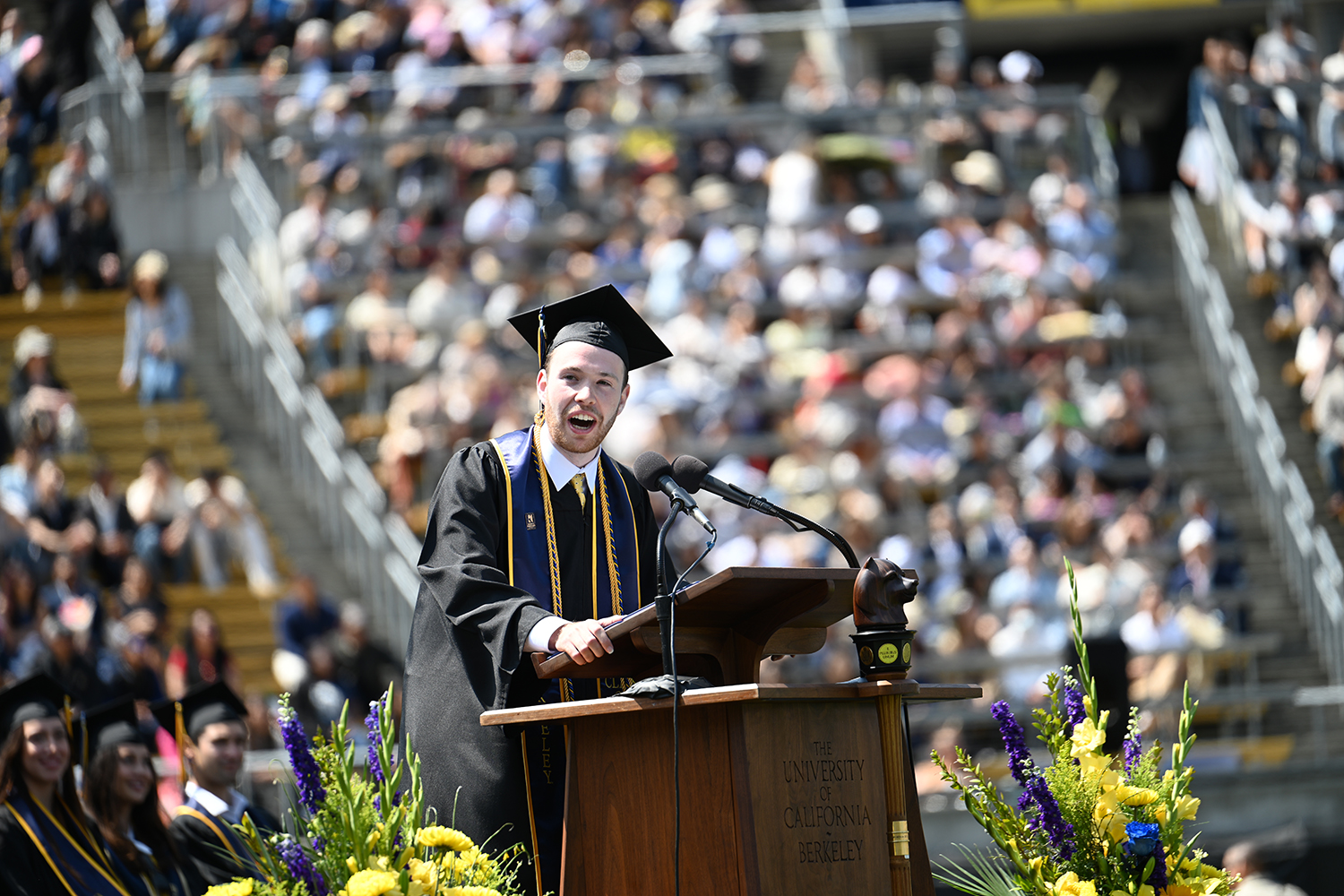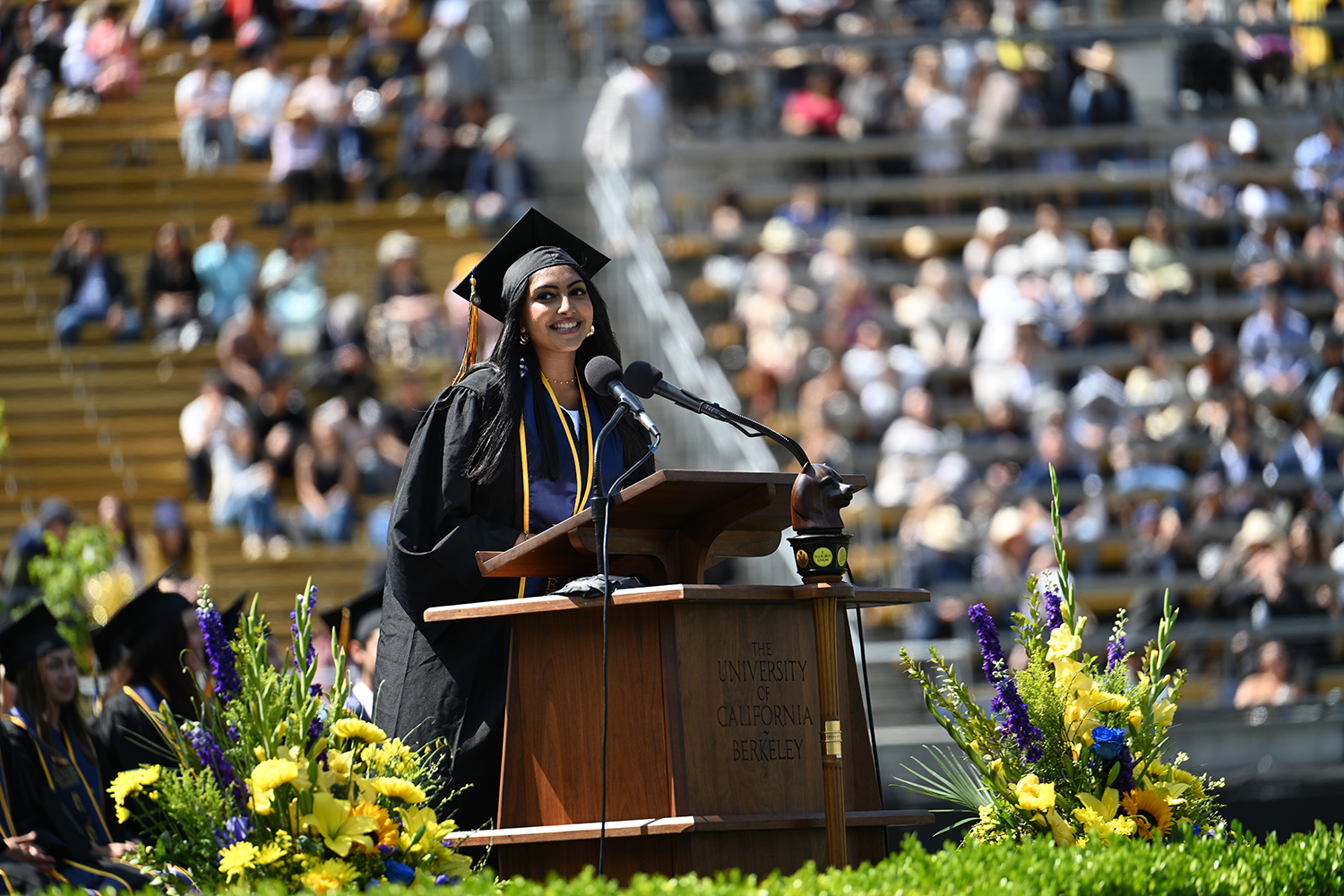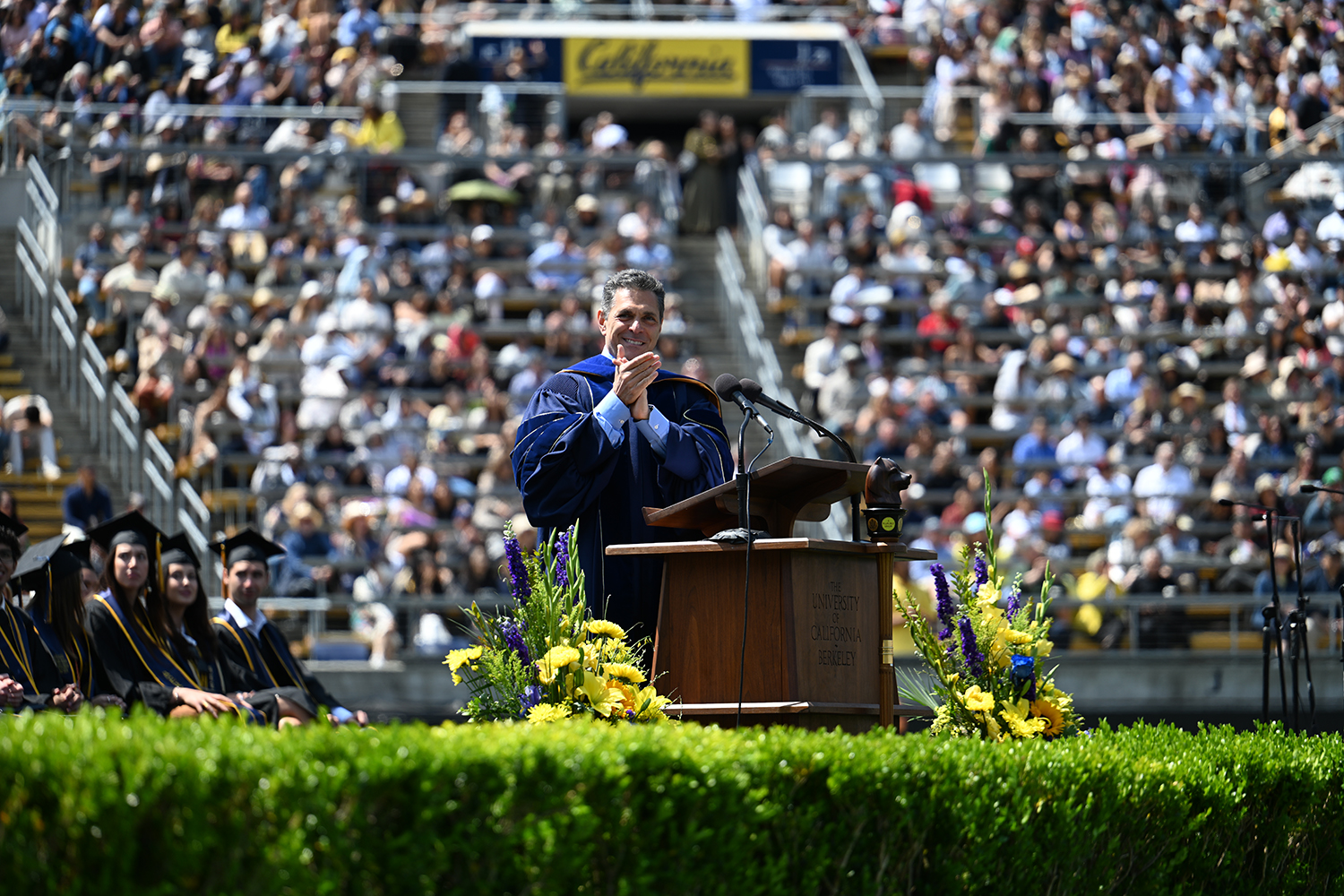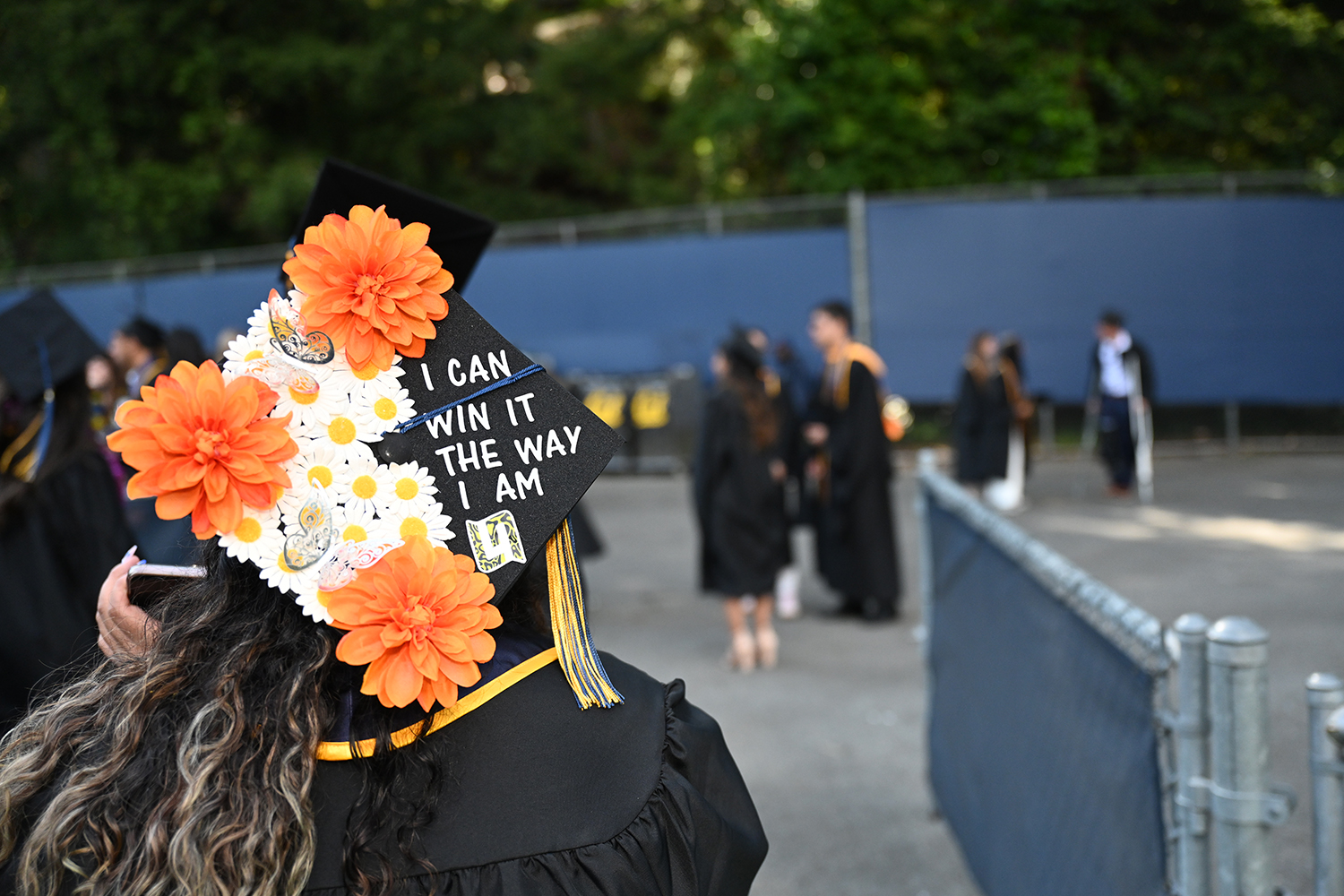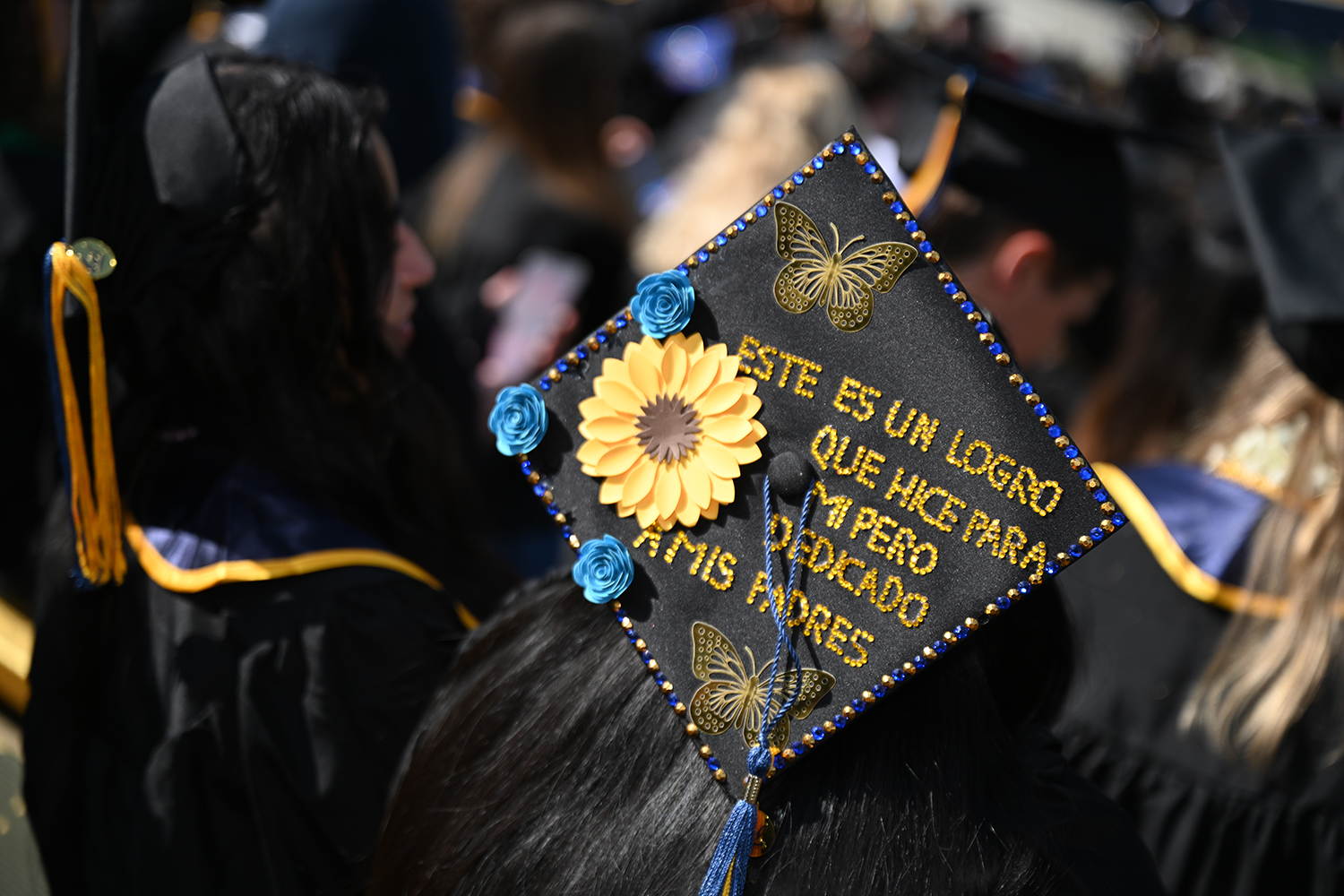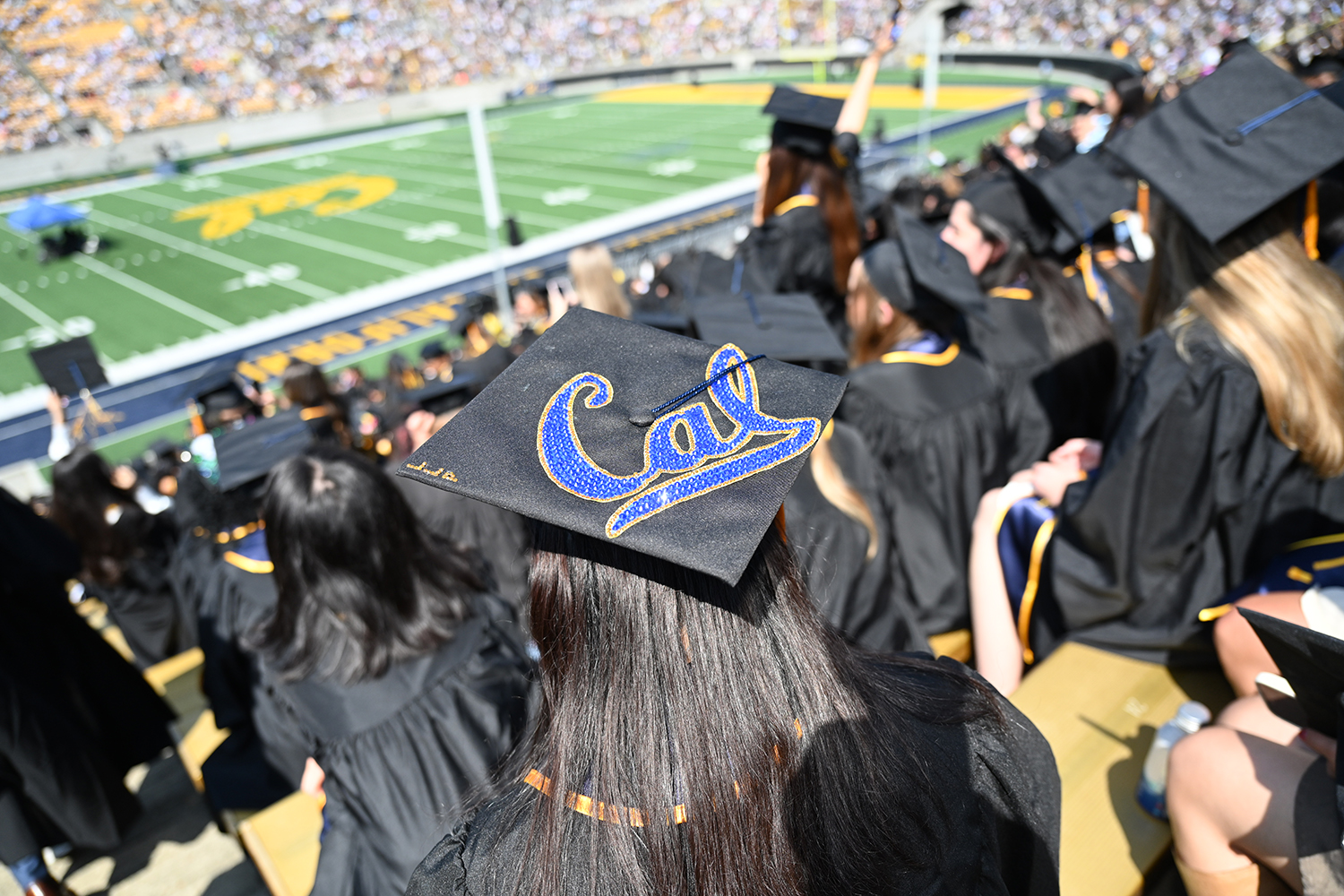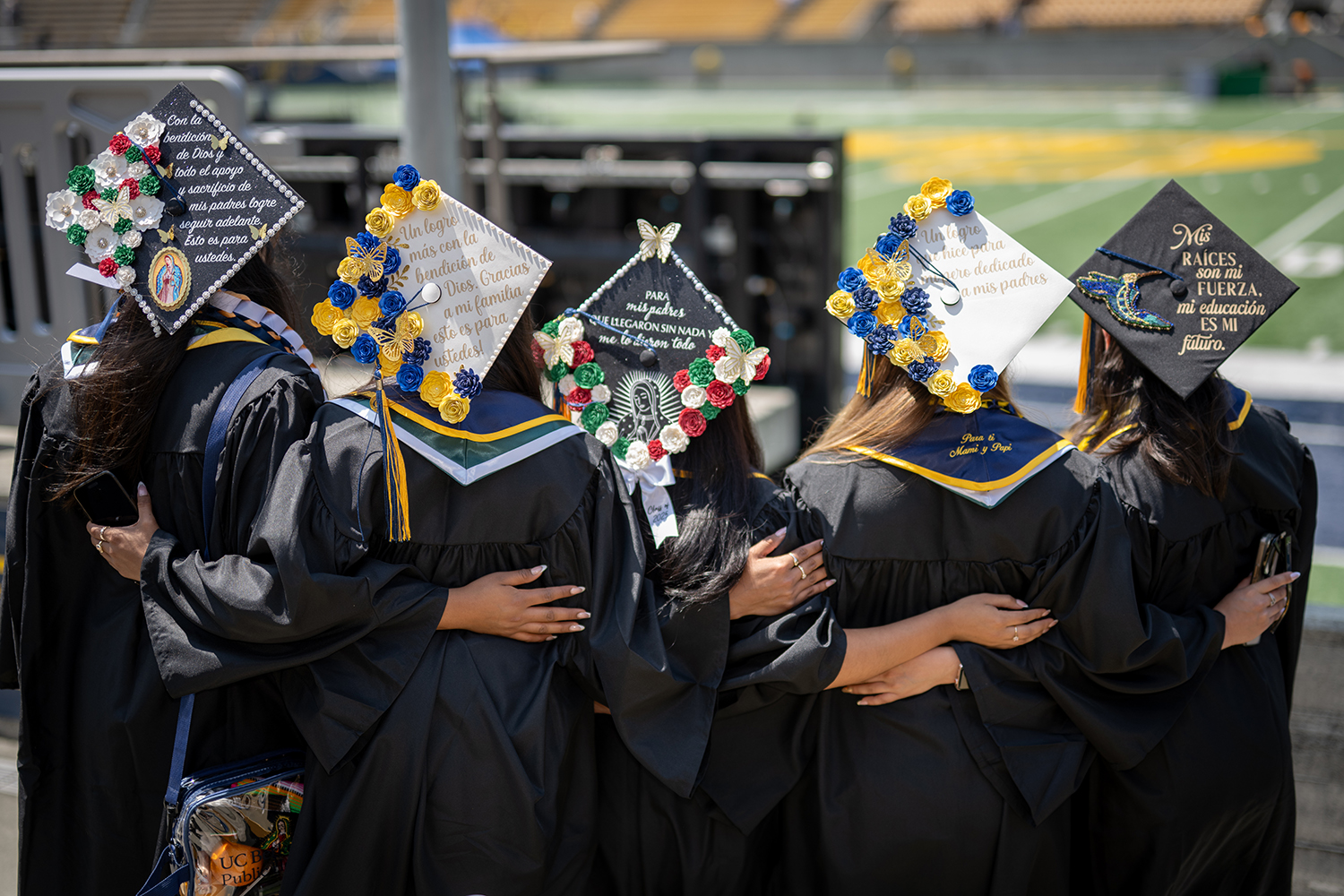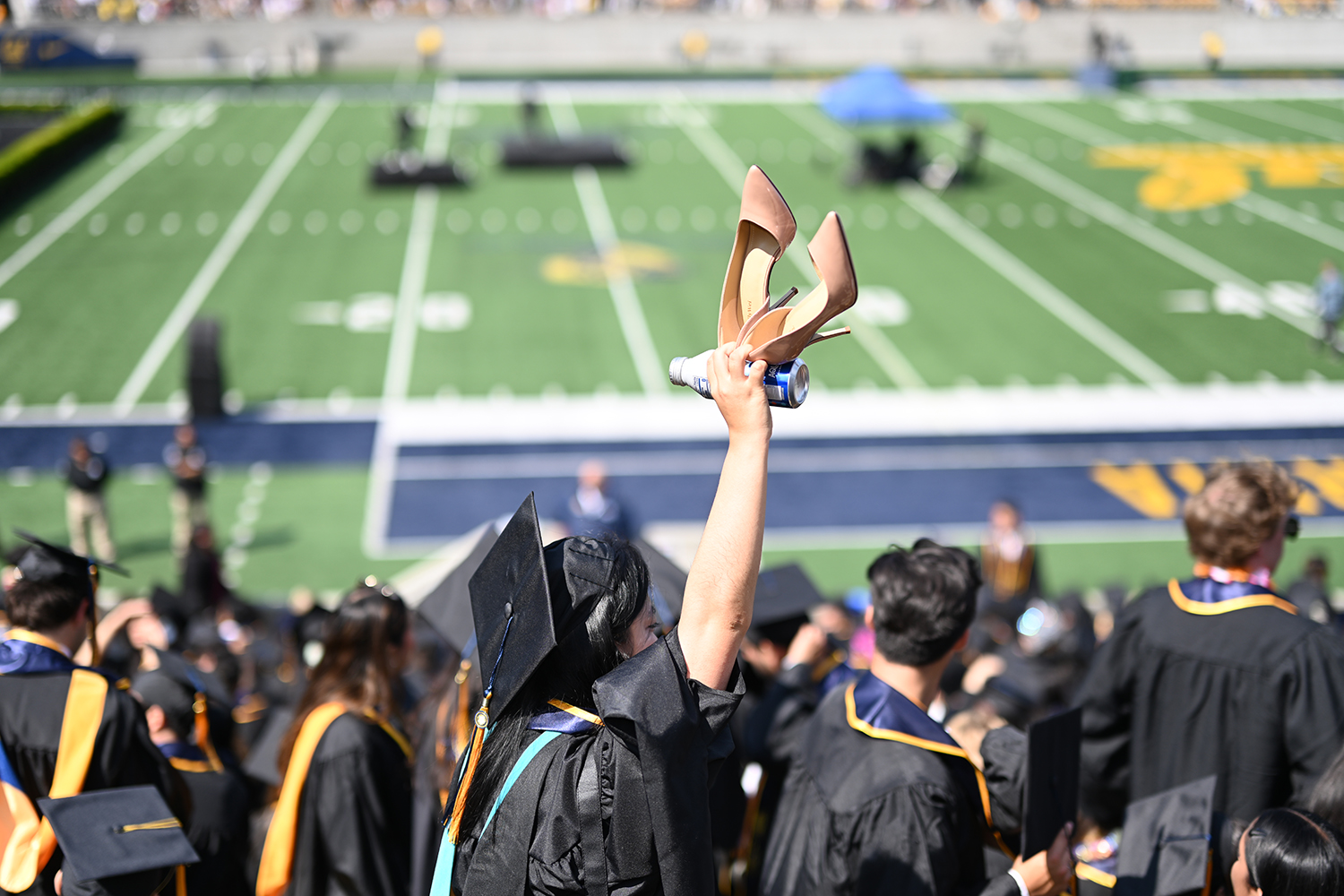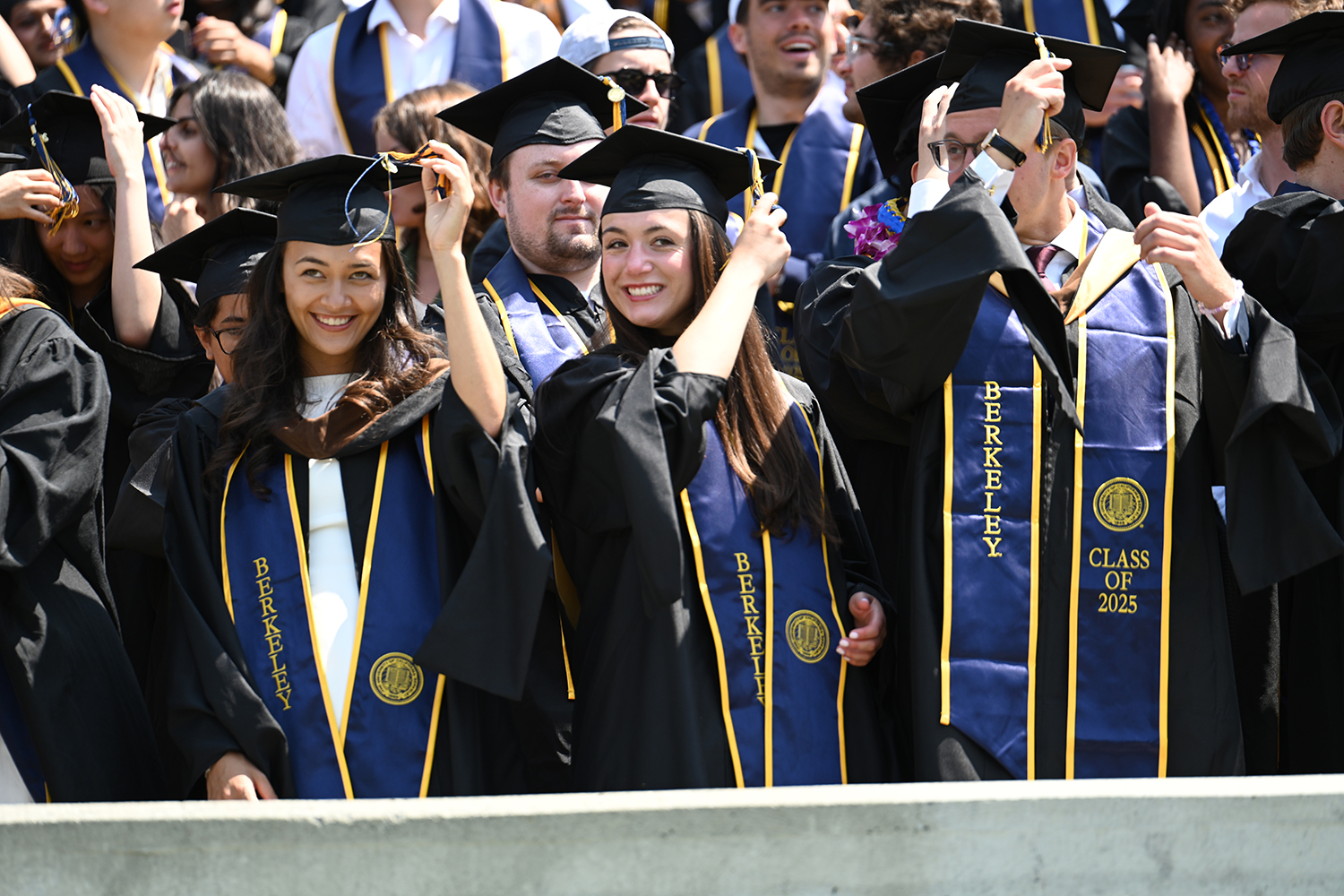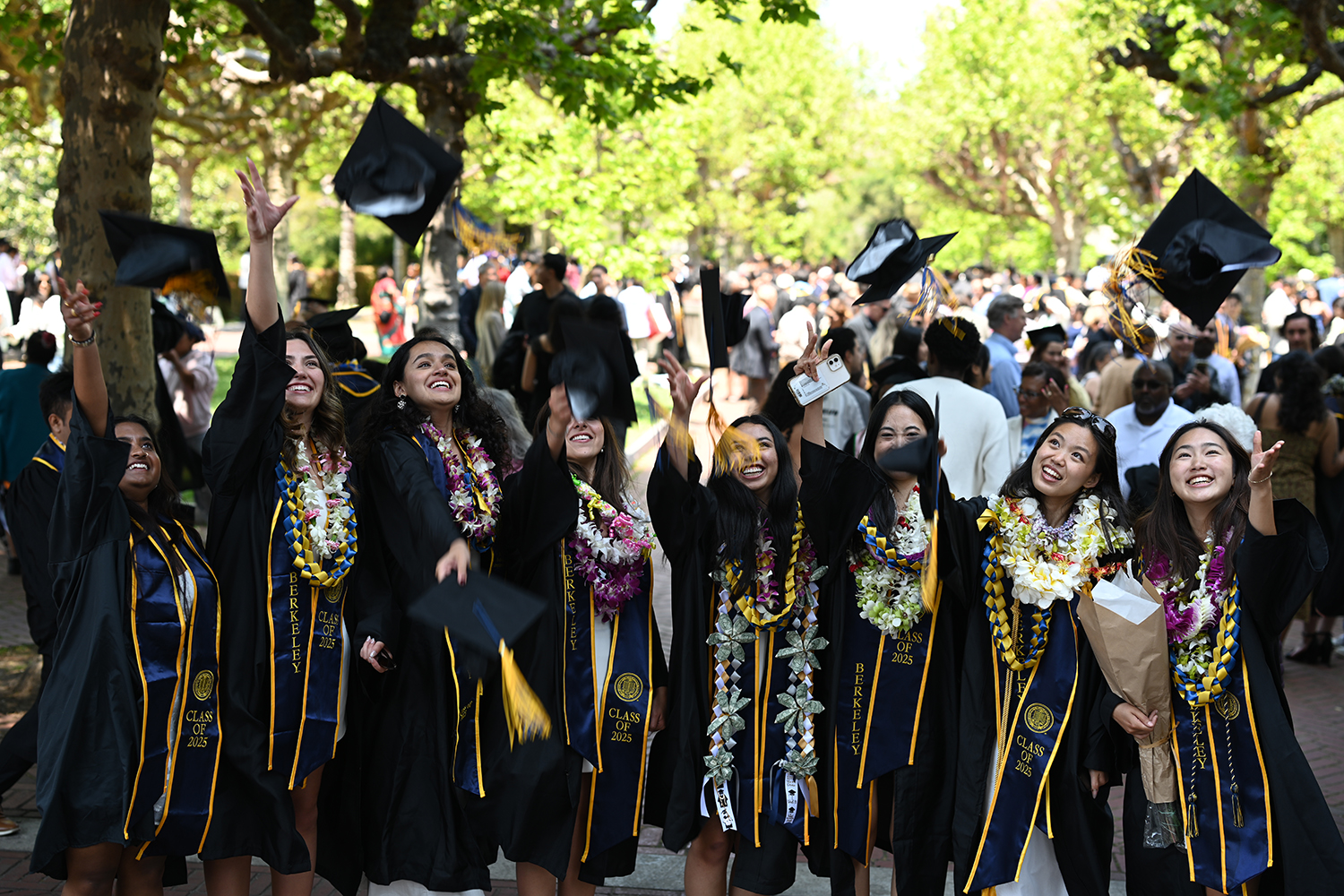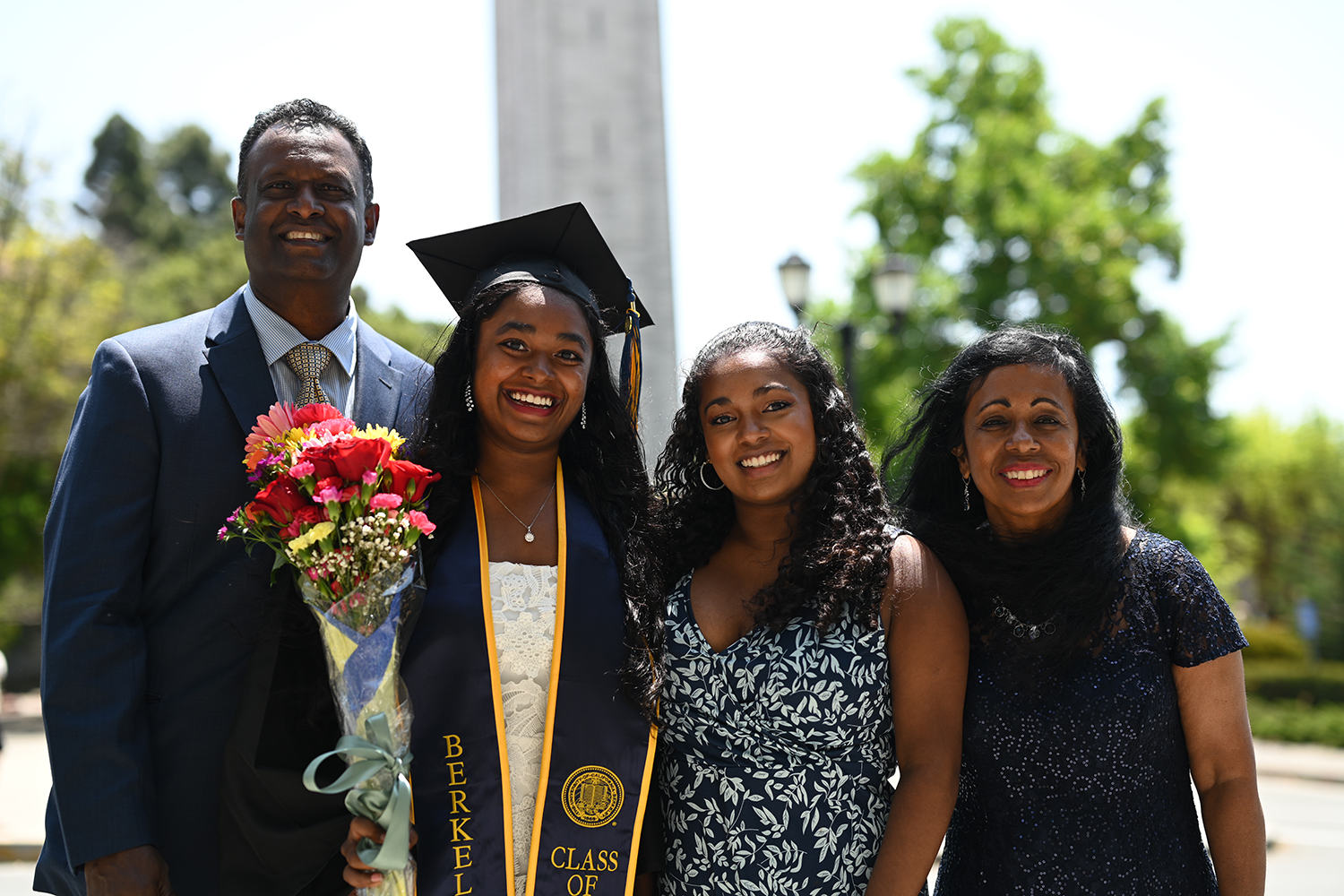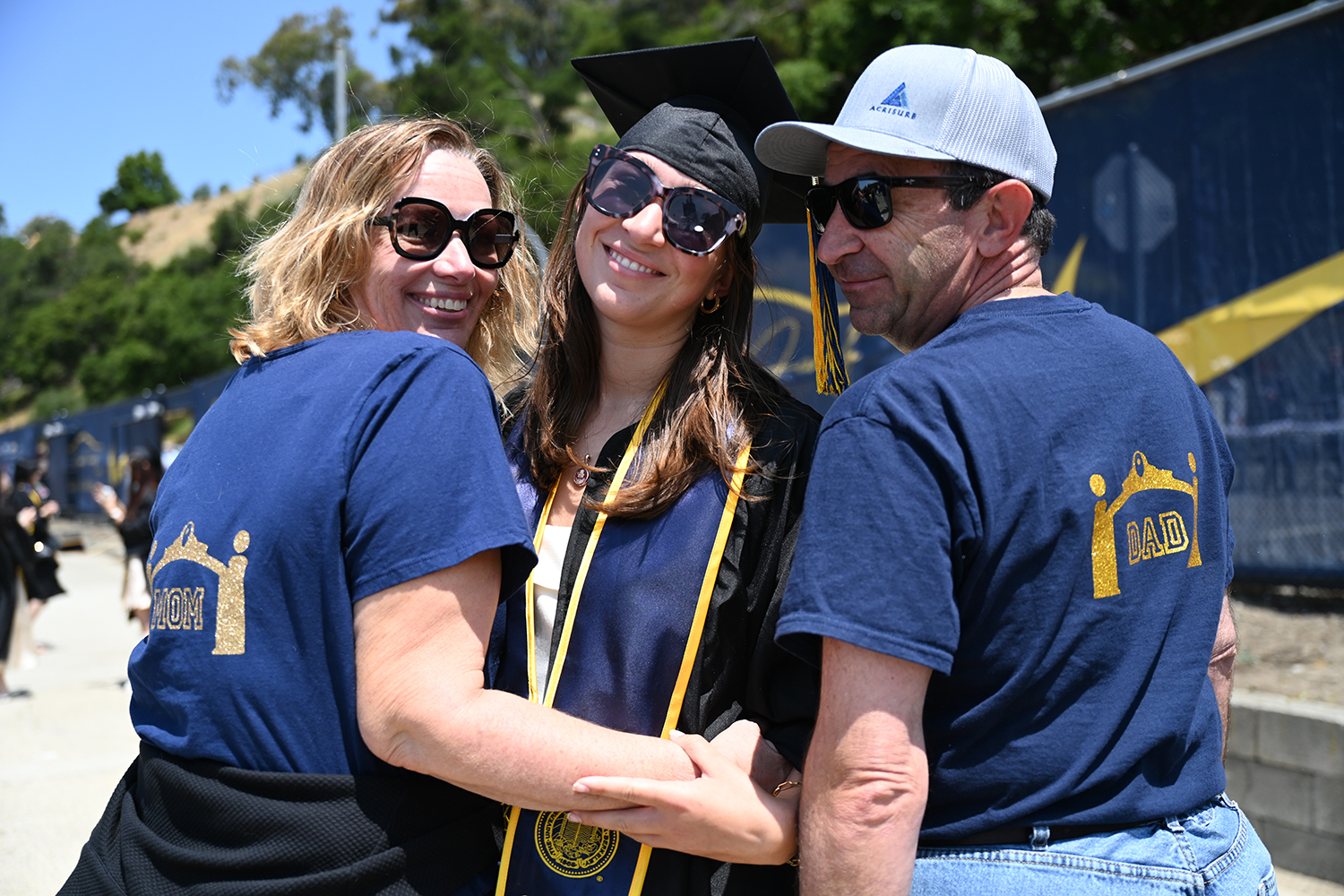At UC Berkeley’s campuswide commencement, grads were grateful for their personal growth — and four Big Game wins in a row
Saturday’s sun-filled ceremony at California Memorial Stadium was attended by 7,000 new graduates and 23,000 of their loved ones.
May 17, 2025
On Saturday morning, the mood outside UC Berkeley’s California Memorial Stadium was effervescent. Some students blew soap bubbles into the air as they paraded, in a river of blue and gold, toward their 2025 campuswide commencement ceremony. Others sported sparkly stilettos, and some wore mortarboards with crocheted or bedazzled adornments. As they approached the amphitheater from Witter Rugby Field, many hugged and crowded together for photos.
The annual celebration, attended this year by more than 7,000 new graduates and 23,000 family members, was a joyous send-off for a graduating class that — in large part — first arrived on campus as the COVID-19 emergency lifted and in-person, masked education resumed.
The event’s speakers, however, didn’t dwell on this less-than-ideal beginning; instead, they focused on how Berkeley empowered these students to become changemakers and, crucially, how this year’s seniors got to witness four years in a row of Cal victories over Stanford at Big Game.
In his first spring campuswide commencement address as chancellor, an energized Richard K. Lyons harkened back to his own time as a Berkeley undergraduate. “Berkeley has strived to help you to see the potential and promise in yourself that was not visible before,” he said, adding, “I know that was the case for me when I graduated.”
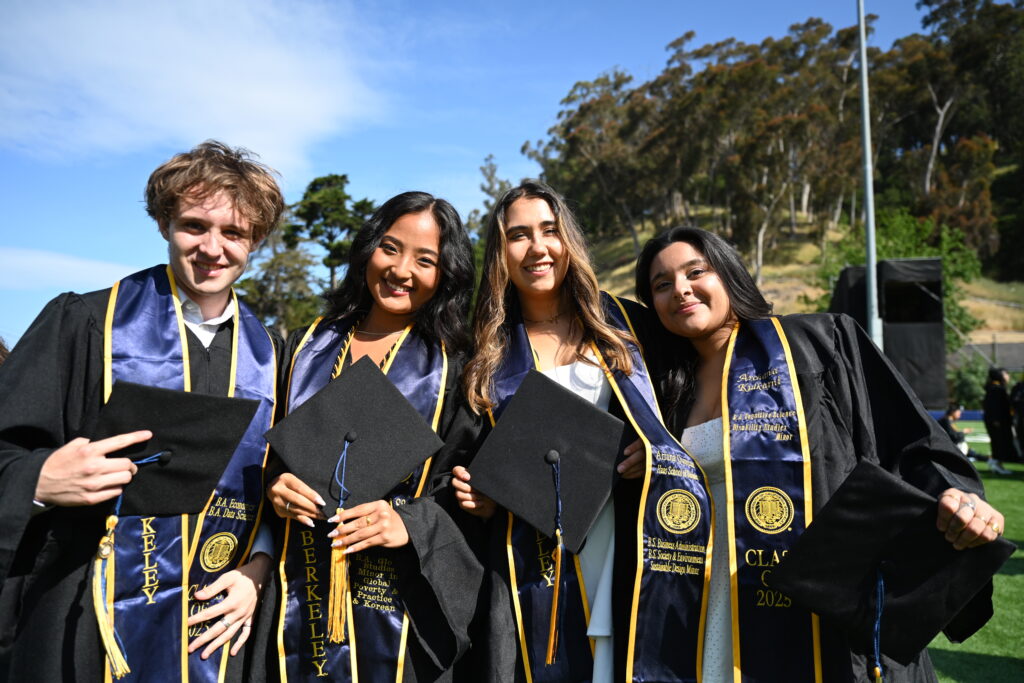
Keegan Houser/UC Berkeley
Before the ceremony, several graduates expressed similar sentiments about having confidently come into their own while at Berkeley.
“Being able to come to a school that’s so diverse, it’s made me learn a lot about people [whom] I hadn’t been able to surround myself with” growing up in predominantly white Chester County, Pennsylvania, said Archana Kulkarni, a cognitive science major who will work as a behavioral technician after graduation. “I feel like I’ve become a lot more comfortable with myself.”
Standing beside her, her friend Ariana Quintana lamented that their friend group was spreading to all corners of the country, from a banking job in Chicago to graduate school in New York City. But she expressed optimism about starting a new phase of life with a “world-class education” that had allowed her to chart her own path by pairing business classes with environment- and sustainability-focused coursework.
Later, standing at the podium, Shrinidhi Gopal, the ASUC president, mirrored those friends’ feelings of growth, gratitude and purpose: “Each of us [is] taking a different path, but all of us [are] carrying the same legacy of intellectual fire, relentless drive and a refusal to settle for the world as it is. And though we may be walking out through Sather Gate for one last time, the light we found here — the light we became here — will never stop walking with us.”
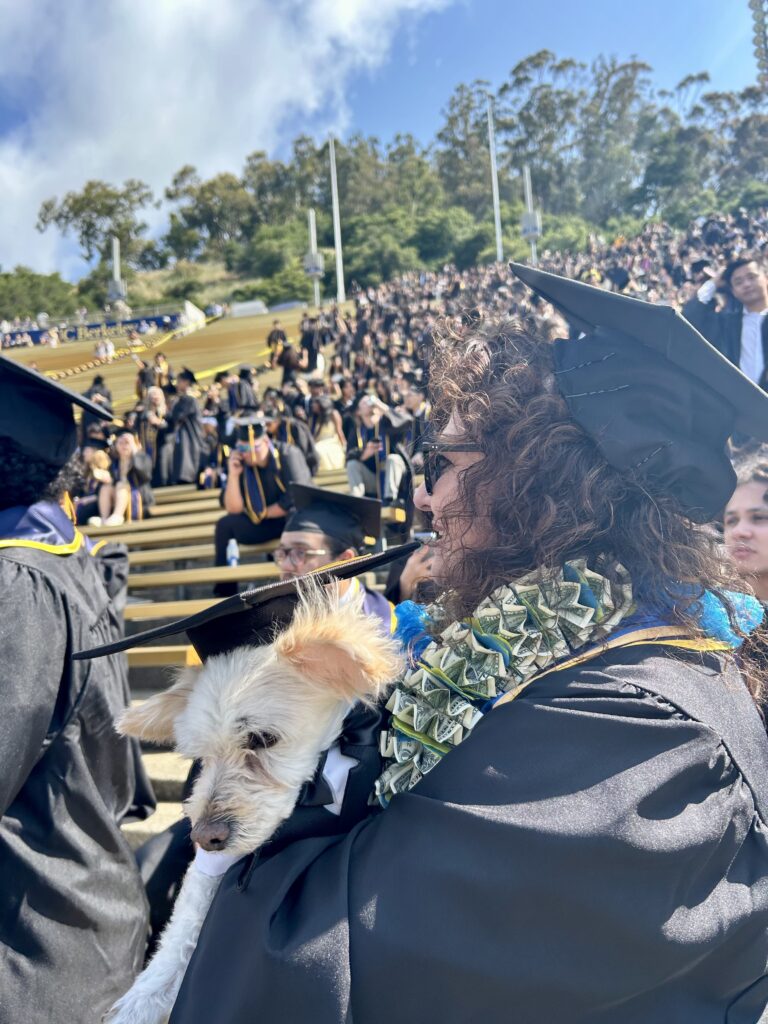
Lila Thulin/UC Berkeley
Regents’ and Chancellor’s Scholar Marlo de la Mora had a front-row seat to take in Gopal’s words. Sitting with her fellow transfer students and with Einstein, her Chihuahua-toy poodle mix, on her lap, de la Mora was jubilant to be graduating with a degree in anthropology after she’d had to drop out of college decades ago due to recurring medical issues following her lupus diagnosis.
After a marriage, two children and a divorce, not to mention forming a chronic illness support group and a related business, de la Mora decided to return to school when she was bedridden, recuperating from a spinal surgery.
“There’s only so much Netflix you can watch. There’s only so many games you can play. I was getting bored,” she said. So she took inspiration from her nieces, who were preparing for a new school year, and returned to community college for her associate degree before transferring to Berkeley. Einstein, a well-behaved therapy pup, accompanied her to classes where she learned about disability studies and how different cultures approach health and traditional medicine.
Twenty-five years after she’d first started college, de la Mora was cheered on in the stands by her children and some 20 other relatives, who were wearing shirts with her face stamped proudly on them.
Media studies major Gavriel Curameng’s route to Berkeley also wasn’t what he’d once expected. On a whim, he’d applied to be one of the students who anonymously bring Oski the Bear to life. To his surprise, he got the job and traveled across the country, waving and hyping up crowds in a fuzzy costume. Yesterday, he was finally allowed to reveal his double life as the campus mascot on Instagram.
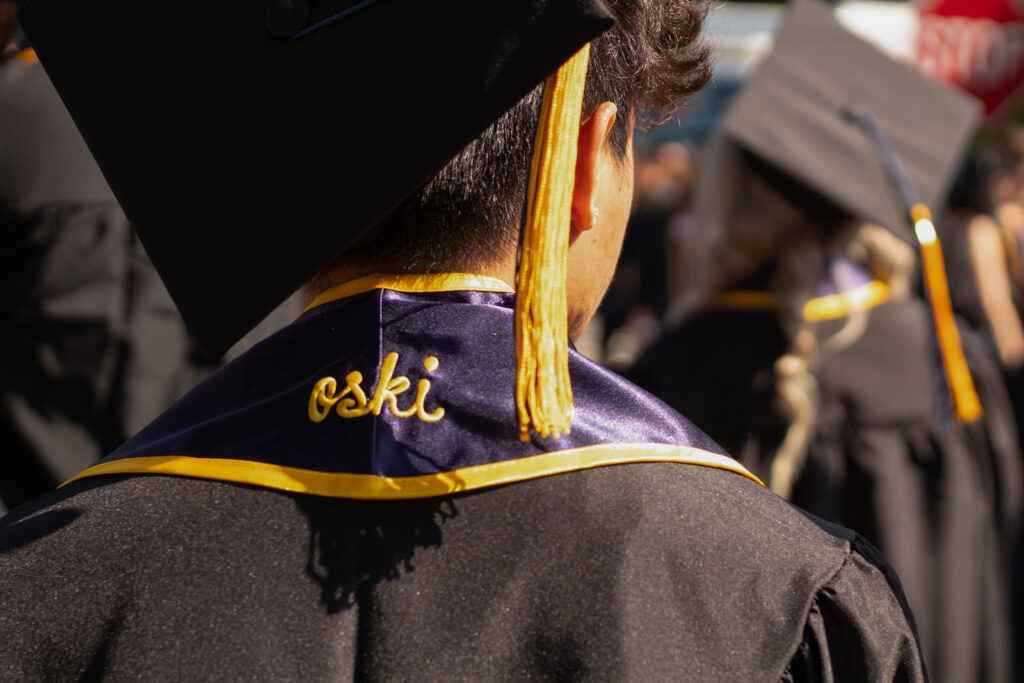
Marissa Gutierrez/UC Berkeley
While Curameng lifted the energy of countless crowds at athletic events with his Oski antics, he said he was buoyed personally at Berkeley by the Filipino community. Many of his peers walked beside him before the ceremony as they headed to their seats on the bleachers.
“The Filipino community made me feel seen, which is not too easy at a large public university,” he said. A few steps ahead of him, a friend smiled and snapped his fingers in agreement.
Not everyone wearing regalia was at the stadium as an undergraduate. Sydney Lister and Chelle Davies had participated in Berkeley’s mostly remote, top-ranked master of information and data science program. The classmates flew in from Seattle and Boston, respectively, to receive their master’s degrees this week.
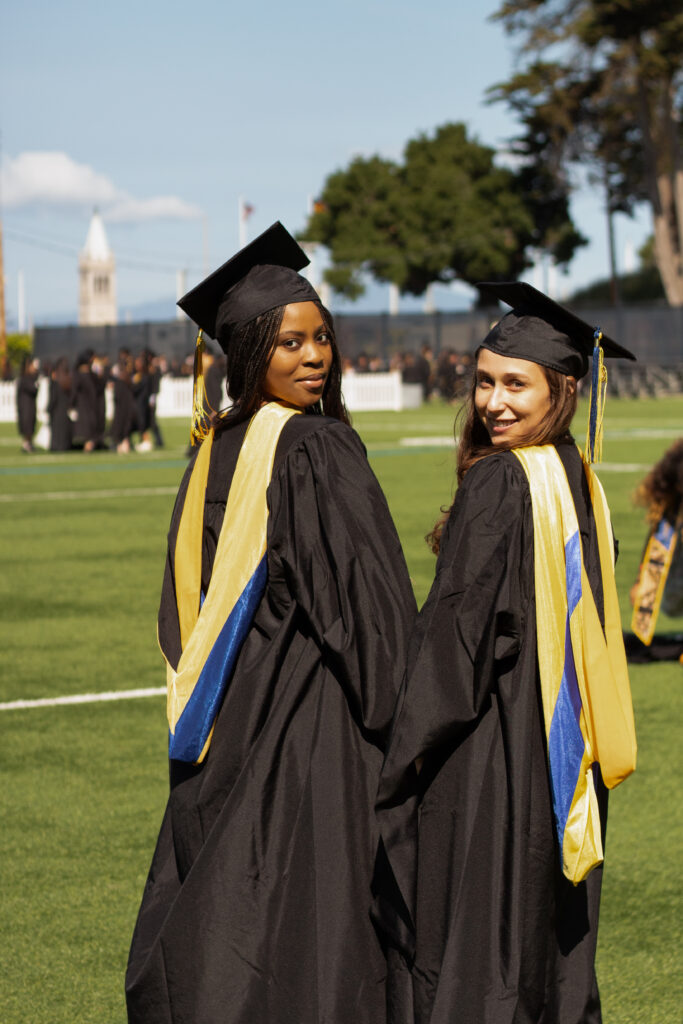
Marissa Gutierrez/UC Berkeley
In addition to tasseled caps and honor cords, students customized their regalia to reflect their heritages, beliefs, campus activities and the loved ones who had encouraged them.
Tora Hoar Vea wore a tapa cloth made of beaten bark, a nod to her Tongan culture, as well as a women’s rugby stole. Maddy Fukuda’s neck was draped with multiple leis and two giant, faux-candy necklaces that relatives had bestowed upon her. Elizabeth Moore’s cousin, who wasn’t able to watch her relative graduate, decked out Moore’s mortarboard in flowers, gears to allude to her mechanical engineering degree and red letters that stood for Santa Barbara City College, where Moore began her collegiate journey.
Estefania Lopez, who grew up in Lancaster, California, had put flowers and 3D golden butterflies on one side of her mortarboard. On the other side, in matching gold lettering that reflected the sunlight, was a message in Spanish that translated to: “Dedicated to my parents for being the wind beneath my wings and my source of inspiration.” Lopez, who majored in psychology, said she was deeply thankful for the sacrifices that her parents, immigrants from El Salvador and Guatemala, had made for her education — including offering to sell their house to pay for her tuition. With her degree, Lopez said, “I want to help people in my community with mental health, because it is very stigmatized.”
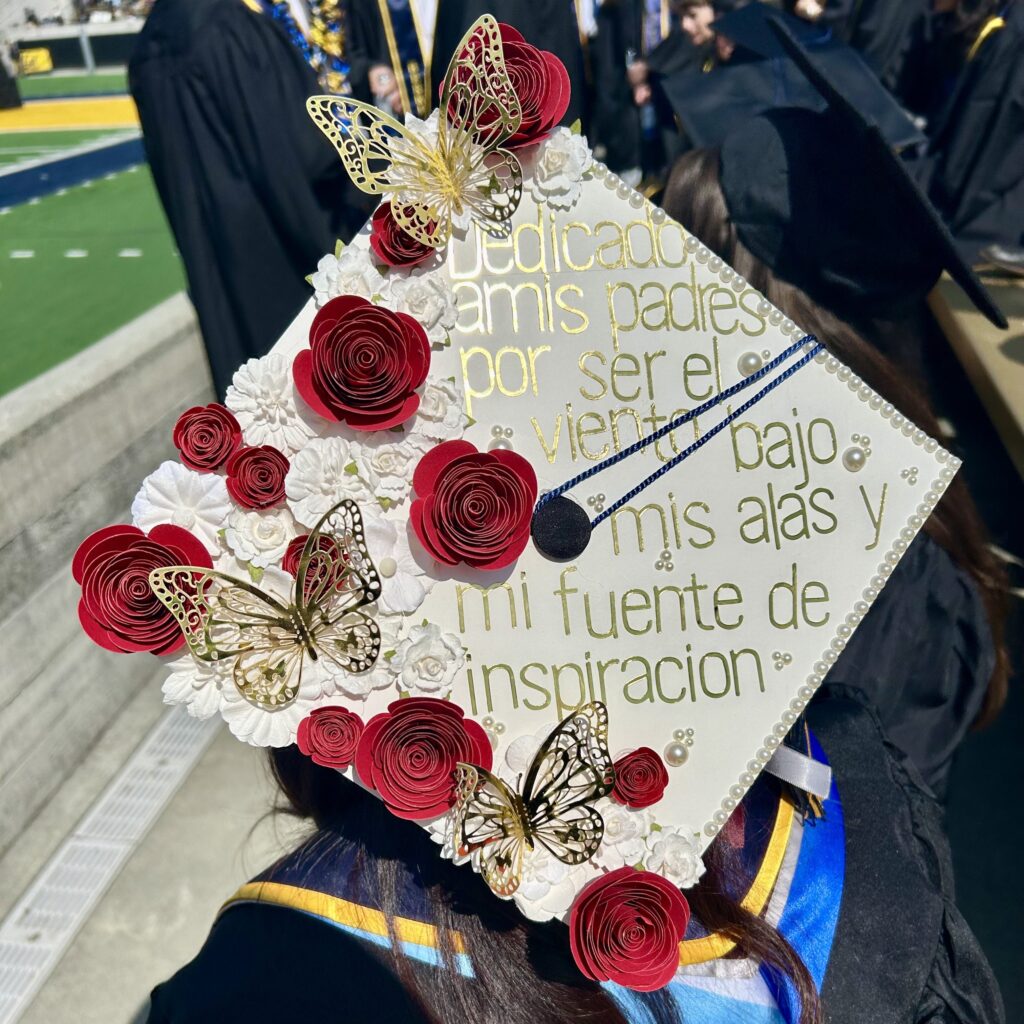
Lila Thulin/UC Berkeley
Outreach was also emphasized by keynote speaker Daniel Lubetzky, the KIND snack company founder and a new Shark Tank judge. After talking about the “superpowers” of youth — grit, fearlessness, creativity and love — he told the graduates that two KIND bars would be waiting for each of them upon exiting the stadium. He encouraged them to share one with someone who’d supported them on their academic journey and the other with someone they’d had disagreements or differences with, to “rebuild a bridge.”
Before the graduates reunited with their families for celebratory hugs and picked up their KIND bars, the California Victory Cannon fired from above the stadium and, before the smoke had fully cleared, the students moved their tassels from the right side of their caps to the left.
The stadium rang loudly with cheers.
